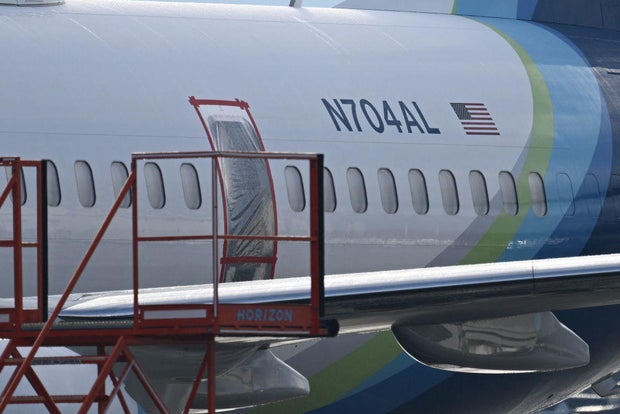The Justice Department is investigating the Jan. 5 Alaska Airlines door blowout and whether anything that led up to, or contributed to it, could affect the deferred prosecution agreement aircraft manufacturing giant Boeing entered into with the Justice Department in 2021, a person familiar with the investigation confirmed to CBS News.
As part of the agreement, which was the resolution of criminal charges that stemmed from 737 Max crashes, Boeing agreed it would not violate any laws or terms of the agreement.
The Justice Department is reviewing whether Boeing abided by those terms, as the Alaska Airlines incident falls within that review — it occurred in the time period subject to the deferred prosecution agreement.
“In an event like this, it’s normal for the DOJ to be conducting an investigation,” an Alaska Airlines spokesperson told CBS News in a statement Saturday. “We are fully cooperating and do not believe we are a target of the investigation.”
When reached by CBS News, both Boeing and the Justice Department declined comment.
The news of the Justice Department’s review was first reported by Bloomberg last month and supplemented by the Wall Street Journal Saturday.
In January 2021, Boeing agreed to pay $2.5 billion to settle a criminal charge in connection with two deadly crashes of 737 Max aircraft in 2017 and 2018 that killed a total of 346 people.
In any deferred prosecution agreement, should there be any violation, federal prosecutors are no longer bound by the arrangement and can bring criminal charges should they deem it appropriate. It is not clear or apparent whether the Justice Department has come to any conclusion in this case.
In an interview this week with the Air Current, National Transportation Safety Board chair Jennifer Homendy this week somewhat acknowledged the Justice Department was continuing its review of Boeing, telling the outlet that she thinks the Justice Department “is already doing whatever they are doing separate from us. If it becomes, ‘this was something criminal,’ then we certainly could and would refer it (to the FBI).”
On the night of Jan. 5, Alaska Airlines Flight 1282 was carrying 174 passengers and six crew members bound for Ontario, California, when a door plug of blew out just minutes after the Boeing 737 Max 9 had taken off from Portland, Oregon.
The plane was able to safely return to Portland International Airport. Officials said several people sustained minor injuries, but no one was seriously hurt.
PATRICK T. FALLON/AFP via Getty Images
A preliminary report from the NTSB last month found that four bolts meant to hold the door plug in place were missing.
The incident prompted the Federal Aviation Administration to ground all Boeing 737 Max 9 aircraft for several weeks while they underwent rigorous inspections.
In the immediate aftermath of the incident, Boeing CEO Dave Calhoun admitted to employees in a meeting that the company was “acknowledging our mistake.” Calhoun also met with lawmakers on Capitol Hill in late January, where he told reporters, “We fly safe planes. We don’t put airplanes in the air that we don’t have 100% confidence in.”
Last month, the Boeing executive in charge of the company’s 737 Max production program was let go.
